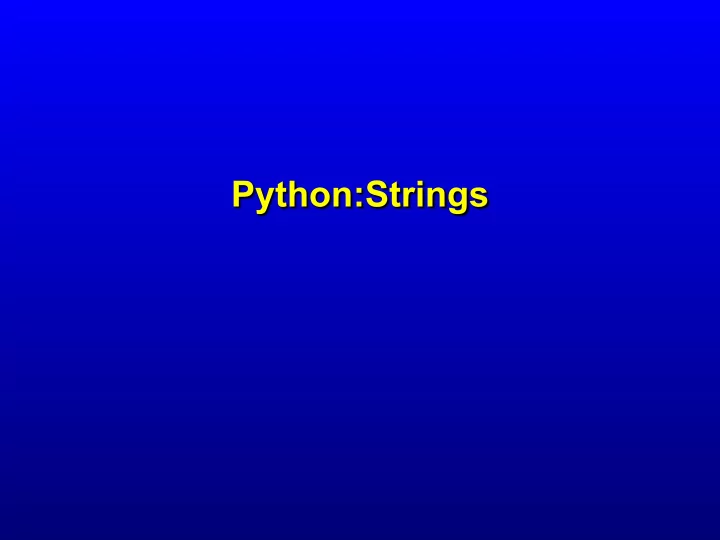

Python:Strings
Strings Source:https://ocw.mit.edu/courses/electrical-engineering-and-computer-science/6-0001-introduction-to-computer-science-and- programming-in-python-fall-2016/lecture-slides-code/
Strings • String is a sequence of characters (case sensitive) fruit = ‘banana’ • len() is a function that gives the length of the string – len(fruit) -> 6 • Can compare strings using ==, >, <
Strings • Square brackets are used to perform indexing into a string to get the value at certain index/position – fruit=“banana” – fruit[0] -> “b” – fruit[1] -> “a” – fruit[2] -> “n” Forward Indexing – fruit[3] -> “a” – fruit[4] -> “n” – fruit[5] -> “a”
Strings • Square brackets are used to perform indexing into a string to get the value at certain index/position – fruit=“banana” – fruit[-1] -> “a” last element at index -1 (n-1) – fruit[-2] -> “n” – fruit[-3] -> “a” Reverse Indexing – fruit[-4] -> “n” – fruit[-5] -> “a” – fruit[-6] -> “b”
Strings • For Loop in string – for i in range(0, len(fruit),2): print (fruit[i]) b n n for letter in fruit: print (letter) b a n a n a
Strings • For Loop in string first = “krsd” last=“ing” for letter in first: print (letter+last) king ring sing ding
Strings • Slicing [start, stop, step] [start, stop] then step = 1 (default) s = “abcdefgh” s[3:6] will give “def” s[3:6:2] will give “df” s[::] will give “abcdefgh” s[::-1] will give “hgfedcba” fruit = “watermelon” print (fruit[:5]) à will give “water” Print (fruit[5:]) à will give “melon”
Strings • Methods To convert to uppercase (capital) letters s = “abcdefgh” capital_s = s.upper() print (capital_s) à ABCDEFGH If the letter is lower case or not fruit = Watermelon if fruit[0].islower(): print (“The first letter is not a capital”) else print (“The first letter is a capital”)
Strings • Methods Find letter in a string fruit = Watermelon print (fruit.find(“m”)) à 5 (found at forward index) print (fruit.find(“g”)) à -1 (is not found) print (fruit.find(“e”,4)) (starts search for e from index 4) à 6
Strings • Comparison ==, >, <, etc. (alphabetical order) word1 = “hello” word2 = “yellow” if (word1 < word2): print (word1 + ’ comes before ‘ + word2) else: print (word2+ ‘ comes before ‘ + word1)
Strings • Strings are immutable i.e., they can not be changed. It can be sliced and concatenated. word1 = “hello” word1[0]=‘y’ Not Possible! word2 = word1[1:len(word1)] word2 = ‘y’+word2
Strings Exercises • 1. Given two words print the longer word. 2. Count number of common letters in two words 3. Count number of words in a given string. 4. Given a word, get another word where all 'e's are replaced by 'i'. 5. Given a word, print it so that the first letter is in upper case form (Capital letter) 6. Write a function which returns True if given word contains the letter ‘e’, else it returns False.
Recommend
More recommend